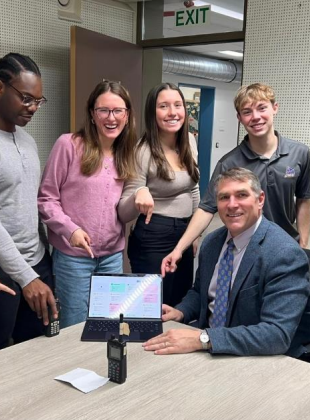Frequencies of diplomacy
News
SUMMARY: This summer, an interdisciplinary student team from JMU’s Diplomacy & Defense Lab was selected to participate in the highly competitive Department of Defense fellowship program.
This summer, an interdisciplinary student team from JMU’s Diplomacy & Defense Lab, sponsored in part by CAL, was selected to participate in the highly competitive Defense Innovation Summer Fellows Program. This 10-week incubator, hosted by the Department of Defense’s Innovation Unit, supports the development of defense-related startups and provides selected teams with mentorship, funding and commercialization pathways.

Members of Seeing the Spectrum, a Hacking for Defense student team from JMU, were selected to develop their product, SpecTrack, a Common Operating Picture platform. SpecTrack was designed to revolutionize how the U.S. Army manages electromagnetic spectrum allocation — assigning frequency bands to different users and applications — during training and operations.
The project started in a Fall 2024 Hacking for Defense (H4D) class at JMU. The team of International Affairs, Finance, and Computer Science students worked on a project given to them by the U.S. Army to address problems they were facing during multinational training exercises in Europe: incompatible spectrum-management systems, limited data-sharing capabilities and security and operational constraints hindering collaboration. SpecTrack facilitates the communication and analysis of spectrum use and availability.
In November 2024, the students received funding from the Common Mission Innovation Fund to conduct on-site research at the U.S. Army’s Joint Multinational Readiness Center (JMRC) in Hohenfels, Germany, where they gathered user feedback to refine their product. They went on to present their product to stakeholders in December 2024 and at the JMU Arts & Letters Undergraduate Research Conference in March 2025.
In June 2025, the JMU team participated in the 10-week Defense Innovation Summer Fellows Program in Palo Alto, CA. The program transforms promising defense-related student projects into viable dual-use startups by connecting students with commercialization advisors, military end users and investors. Abby Fornadel (’24) immediately saw the real-world application of what she had learned in classes: “We are using the methodology we learned at JMU during our H4D class in the real world and applying it directly to founding a company.” The program culminated in a late-August pitch launch to promote dual-use technologies at the Fed Supernova, a defense innovation event, in Austin, Texas.
"At the Diplomacy & Defense Lab, we seek to prepare students for careers in public service,” says Bernie Kaussler, professor of political science. “The Hacking for Defense class is one of those experiences that allows students to work on real-world problems together with the federal government and military. It is high-impact learning for our students that seeks to solve national security and defense problems that the government is facing.”
“For me, this experience and the foundation I got from the JMU H4D program has helped me learn that I want a career where I am working to solve big problems,” says Fornadel. “I want to work collaboratively with my peers to find pain points in current processes and think innovatively about how we can solve them.”
This significant accomplishment for these student innovators attests to CAL’s commitment to collaborative, interdisciplinary research and to JMU’s broader engagement with mission-driven, applied national security research.
See JMU’s Diplomacy & Defense Lab website for more information.
